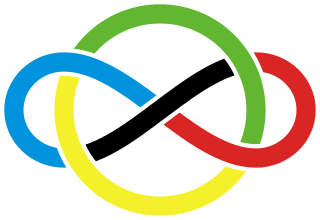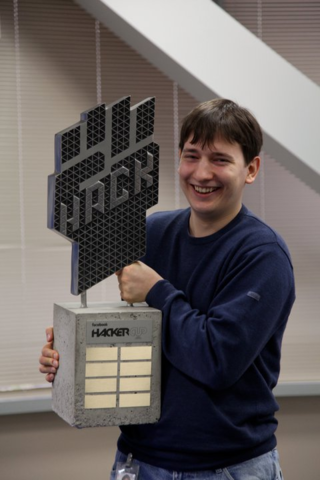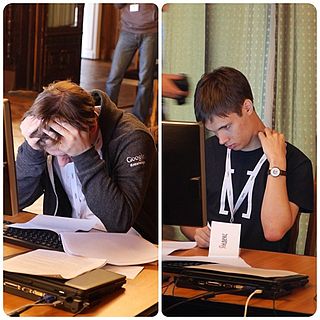
The International Olympiad in Informatics (IOI) is an annual competitive programming competition and one of the International Science Olympiads for secondary school students. The first IOI was held in 1989 in Pravetz, Bulgaria.

The International Mathematical Olympiad (IMO) is a mathematical olympiad for pre-university students, and is the oldest of the International Science Olympiads. It is "the most prestigious" mathematical competition in the world. The first IMO was held in Romania in 1959. It has since been held annually, except in 1980. More than 100 countries participate. Each country sends a team of up to six students, plus one team leader, one deputy leader, and observers.
Hong Kong Olympiad in Informatics is an annual programming competition for secondary school students in Hong Kong, emphasizing on problem solving techniques and programming skills. It is co-organized by the Hong Kong Association for Computer Education (HKACE) and the Hong Kong Education Bureau (EDB). It serves as a preliminary contest to international, national and regional competitions such as the China National Olympiad in Informatics (NOI) and the International Olympiad in Informatics (IOI). The first HKOI was held in 1997.
The Canadian Computing Competition (CCC) is an annual programming competition for secondary school students in Canada, organized by the Centre for Education in Mathematics and Computing at the University of Waterloo. Stage 1 is written at high schools and can be written in the programming language of the students' choice, with only a few, such as Maple and Mathematica, disallowed. There are two levels of problems presented, Junior and Senior. The top 20 students in the Senior division are invited to the University of Waterloo to participate in Stage 2, the Canadian Computing Olympiad (CCO). CCO participants are restricted to languages permitted at the IOI, which currently includes only Java, C and C++.. The CCO is used to select students to represent Canada at the IOI.
The United States of America Computing Olympiad (USACO) is an online computer programming competition, which serves as qualification for the International Olympiad in Informatics (IOI) in the United States of America. Primarily for secondary school students in the United States, the USACO offers four competitions during the academic year. Participants compete in four increasingly difficult divisions, each of which is provided a distinct set of 3 solvable competitive programming problems during each contest. Coding & submitting computer programs can be done in one of four languages: C, C++, Java, and Python. Competitors begin in the Bronze division, and advance through the levels by performing well in their current division.
The Central European Olympiad in Informatics (CEOI) is an annual informatics competition for secondary school students. Each of the participating central European countries (plus one or two guest countries, and a local team from the host area) sends a team of up to four contestants, a team leader and a deputy team leader. The contestants compete individually, i.e. a team score is not calculated. Competitors are selected through national competitive programming contests.
The International Science Olympiads are a group of worldwide annual competitions in various areas of the formal sciences, natural sciences, and social sciences. The competitions are designed for the 4-6 best high school students from each participating country selected through internal National Science Olympiads, with the exception of the IOL, which allows two teams per country, the IOI, which allows two teams from the hosting country, and the IJSO, which is designed for junior secondary students. Early editions of the first Olympiads were limited to the Eastern Bloc, but later they gradually spread to other countries.

Woburn Collegiate Institute is a semestered, English-language public secondary school on Ellesmere Road in the Woburn neighbourhood of the Scarborough district of Toronto, Ontario, Canada operated by the Toronto District School Board. From its inception in 1963 until 1998, it was operated by the Scarborough Board of Education.
Reid William Barton is a mathematician and also one of the most successful performers in the International Science Olympiads.
The South African Computing Olympiad (SACO) is an annual computer programming competition for secondary school students in South Africa. The South African team for the International Olympiad in Informatics is selected through it.
The Indian Computing Olympiad is an annual computer programming competition that selects four participants to represent India at the International Olympiad in Informatics. ICO is conducted by the Indian Association for Research in Computing Science. The competition is held in three stages. For the first stage, students may compete in the Zonal Computing Olympiad, or the Zonal Informatics Olympiad. The following two rounds are the Indian National Olympiad in Informatics and the International Olympiad in Informatics Training Camp.
This article describes the selection process, by country, for entrance into the International Mathematical Olympiad.
The HNUE High School for Gifted Students, commonly known as HNUE High School, is a public magnet school in Hanoi, Vietnam. The school was founded in 1966 as a national educational institution to nurture Vietnamese students who excelled at mathematics. HNUE High School is the second oldest magnet high school in Vietnam and one of the seven national-level high schools for the gifted.

Petr Mitrichev is a Russian competitive programmer who has won multiple major international competitions. His accomplishments include gold and silver (2001) medals in the IOI, gold medals in the ACM ICPC World Finals as part of the team of Moscow State University and winning Google Code Jam (2006), the Topcoder Open, the Topcoder Collegiate Challenge, Facebook Hacker Cup as well as numerous national and online contests. He has achieved the highest rating ever among the Algorithm competitors of Topcoder and consistently ranks in the top two of the world. He is the second highest rated Algorithm coder on Topcoder ratings as of February 2021. He currently works at Google on the search engine and helps to prepare Code Jam.

Competitive programming or sport programming is a mind sport involving participants trying to program according to provided specifications. The contests are usually held over the Internet or a local network. Competitive programming is recognized and supported by several multinational software and Internet companies, such as Google, and Meta.
The HUS High School for Gifted Students, commonly known as High School for Gifted Students of Science, is a specialized, most-selective public magnet school of VNU University of Science, a member of Vietnam National University, Hanoi system. The school serves as a national educational institution to nurture talented Vietnamese students who excelled at natural sciences. The largest percentage of its graduates attend the most prestigious universities in Vietnam.

Gennady Korotkevich is a Belarusian competitive sport programmer who has won major international competitions since the age of 11, as well as numerous national competitions. Widely regarded as one of the greatest competitive sport programmer of all time, his top accomplishments include six consecutive gold medals in the International Olympiad in Informatics as well as the world championship in the 2013 and 2015 International Collegiate Programming Contest World Finals. As of October 2023, Gennady is the highest-rated programmer on Codeforces, CodeChef, Topcoder, AtCoder and HackerRank. In August 2024, he achieved a historic rating of 4009 on Codeforces, becoming the first to break the 4000 barrier.
Makoto Soejima is a Japanese former competitive programmer. He is one of three people to have won both the Google Code Jam and the Facebook Hacker Cup and the only one to have also won a gold medal with a perfect score at the International Mathematical Olympiad (IMO). In International Science Olympiads, he has won three gold medals and one bronze in the International Mathematical Olympiad as well as two silver medals in the International Olympiad in Informatics (IOI).
Andrew He is an American competitive programmer and the winner of the 2021 Facebook Hacker Cup.





